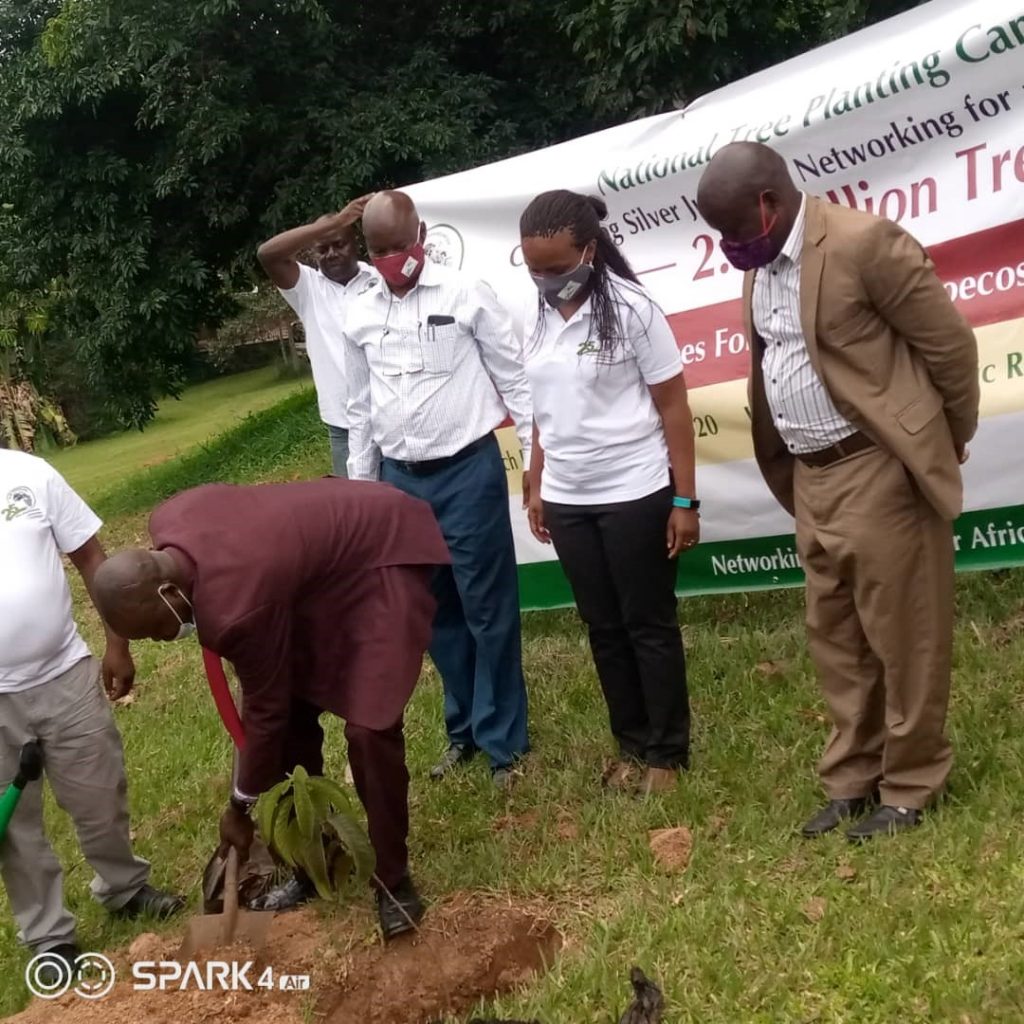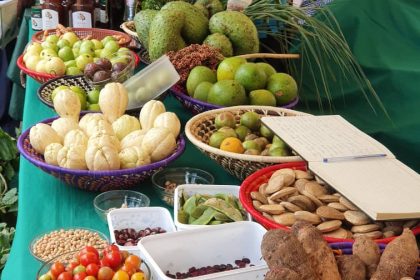PELUM Uganda to plant 2.5 million trees
 John Ludongkol, the Assistant Commissioner for Crop Protection in the Ministry of Agriculture and Forestry, flags off the tree-planting campaign at Entebbe Botanical Gardens October 27. Standing left is Dr. John Mulumba, the curator of the gardens and Stella Lutalo the country coordinator for PELUM in Uganda.
John Ludongkol, the Assistant Commissioner for Crop Protection in the Ministry of Agriculture and Forestry, flags off the tree-planting campaign at Entebbe Botanical Gardens October 27. Standing left is Dr. John Mulumba, the curator of the gardens and Stella Lutalo the country coordinator for PELUM in Uganda.
PELUM Uganda, the local chapter of the Participatory Ecological Land Use Management Association, will plant 2.5 million trees over the course of the next twelve months, as part of efforts to restore forest cover in the country.
The tree planting campaign forms part of activities to celebrate the associations 25th anniversary.
With 280-member civil society organisations spread across 12 countries in across east, central and southern Africa, PELUM seeks to improve the livelihoods of small-holder farmers and the sustainability of rural communities through ecological land management.
Speaking during the launch of the campaign at the122 year-old Entebbe Botanical Gardens on October 27, Stella Lutalo, the Coordinator of PELUM in Uganda, said the association would mobilise the different stakeholders and partners to participate in tree planting and regeneration activities that will see 2.5 million indigenous tree species and fruit trees planted between October 2020 and October 2021.

Stella Lutalo
“Although the ministry of water and environment reported an increase in forest cover to 12pc in 2019, a lot more collaborative effort is needed to combat deforestation, especially on private farmlands which are habitats to a variety of indigenous trees,” said Lutalo .
She cited national Forestry Authority statistics which showed that 65pc of forest degradation takes place on private land as owners reassign it from forestry to agriculture, industry or settlement. In just 26 years between 1990 and 2016, Uganda’s forest cover sharply fell from 24pc of the land surface to just 9pc.
Forestry makes a significant contribution to Uganda’s economy. Forest resources account for 8.7pc of Uganda’s GDP, according to the National Bureau of Statistics. Through their role as a habitat for wildlife and other biodiversity, forestry’s direct contribution to tourism was valued at 2.9pc of GDP in 2017.
Besides planting two food forests with 500 indigenous fruit tree seedlings each in Entebbe and Mityana, PELUM Uganda will through its partners, work with small-holder farmers to plant and undertake regeneration agriculture initiatives at household level to increase tree cover and resilience to climate change effects.
Speaking during the same event, Dr. John Wasswa Mulumba, the Curator of Entebbe Botanical Gardens and head of the Plant Genetic Resources Centre, highlighted the often-overlooked functions of trees in sustaining life on earth. Trees, he said, mine resources from below the earth’s surface and convert them into food for different life forms. For instance, a tree that generates 10,000 seeds can feed a single bird for several months, he said. They are also carbon sinks, helping to maintain the conditions that sustain life on earth.
There are several public sector initiatives to restore tree cover. Although it has faltered, the government has committed to a plan to plant 100 million trees by end of 2021. Fourty million of these will be planted over an eight-hour period on a single day next year, according to Bob Kazungu, an assistant commissioner for forestry at the Ministry of Water and Environment.

 100+ Accelerator selects Ugandan startup Yo-Waste to pilot glass recycling at Nile Breweries
100+ Accelerator selects Ugandan startup Yo-Waste to pilot glass recycling at Nile Breweries
 With eyes on oil and gas, France pledges USD 3 billion investment in Uganda
With eyes on oil and gas, France pledges USD 3 billion investment in Uganda
 Uganda urged to pitch for organic produce during NAM Summit
Uganda urged to pitch for organic produce during NAM Summit
 NOGAMU’s Namuwoza tapped to lead bid for increased intra-African trade in organics
NOGAMU’s Namuwoza tapped to lead bid for increased intra-African trade in organics
 From 3 padlocks to a click: Sipi Organic’s long walk to digital banking
From 3 padlocks to a click: Sipi Organic’s long walk to digital banking
 Nile Breweries launches UGX 4Bn barley processing facility in Kween district
Nile Breweries launches UGX 4Bn barley processing facility in Kween district
